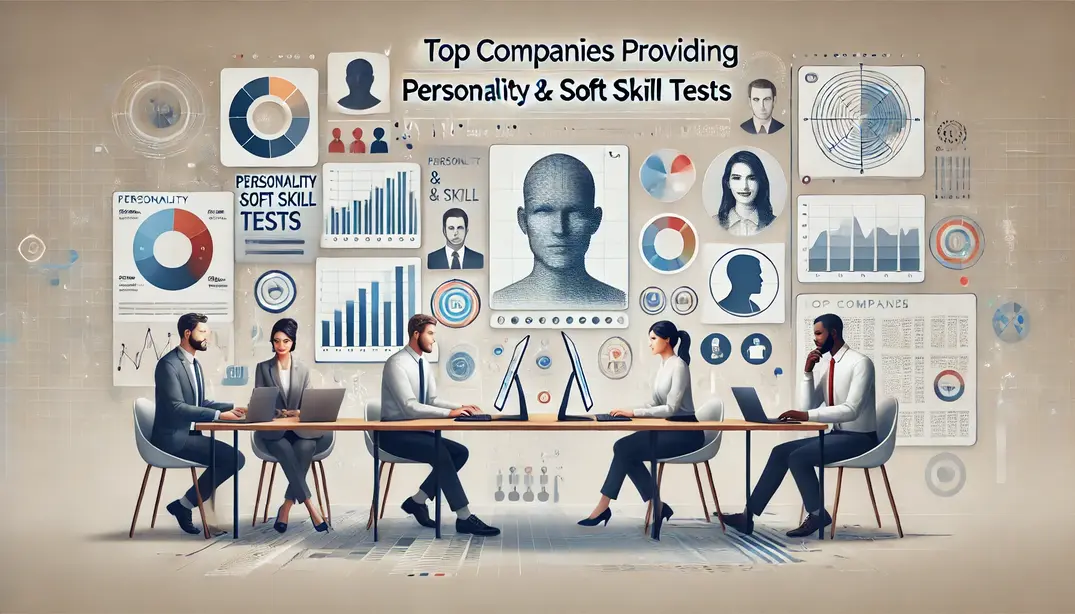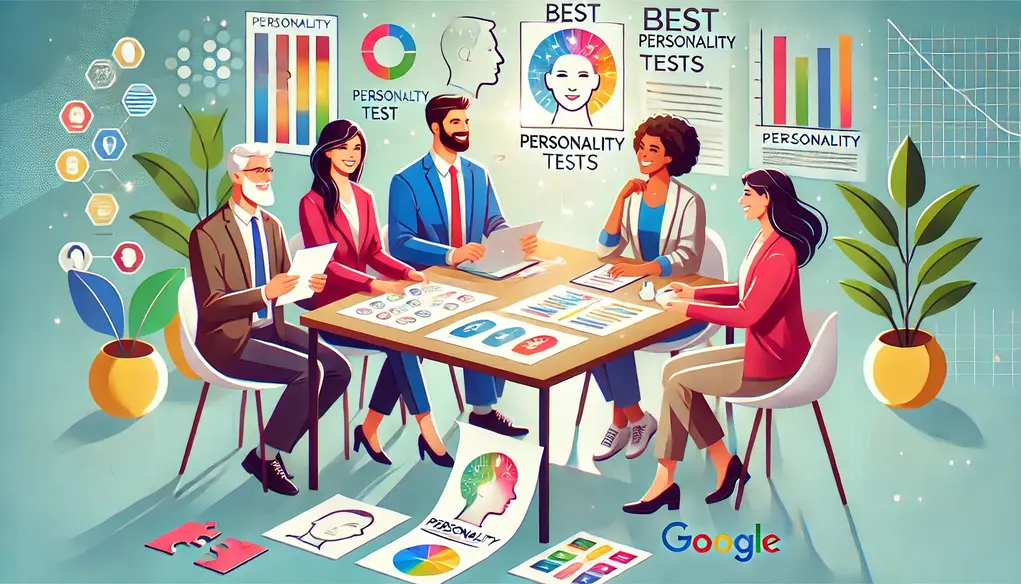Recruitment processes shouldn’t be taken lightly in today’s competitive job market. After all, selecting the perfect from a diverse talent pool can be challenging. To increase productivity during recruitment, we recommended utilizing personality tests.
This blog will address the top 10 pre-employment personality tests for 2025. As we step into 2025, companies should incorporate these tests for maximum efficiency. This will help them receive shaper insights, and enable them to make informed hiring decisions.
Next, we will enumerate the ten best personality tests for 2025. We have added their strengths and limitations for a comprehensive understanding. This will help assess which test can fulfill your unique requirements and goals.
Big Five Personality Traits
Core Idea
The Big Five or Five-Factor Model (FFM) is a globally recognized personality test. It uses a structured approach to personality, drawing on five fundamental trait dimensions. Psychologists believe the five broad dimensions can create a holistic and accurate perception of one’s personality.
This test is also called OCEAN, an abbreviated form of the five personality traits. Openness, conscientiousness, extraversion, agreeableness, and neuroticism. Altogether, it provides a robust framework to assess core skills and performance.
Benefits
The Big Five is a scientifically validated and reliable tool that can be used across various fields. It has a strong predictive power for job fit.
Limitations
Results may be oversimplified for organizations that require specialized assessments. Personalities aren’t just limited to the five OCEAN traits, so the Big Five results might be insufficient.
Hogan Personality Inventory (HPI)
Core Idea
Used in the context of occupational or job performance, the Hogan Personality Inventory offers detailed insights into personalities. It is based on the Five-Factor model, however, it prioritizes aptitudes and behaviors more.
The primary scale of HPI focuses on seven personality scales to create comprehensive data. These scales target different characteristics to predict workplace performance. The main incentive behind creating this test was to enhance effectiveness in workplace settings.
Benefits
HPI has been validated through multiple research, making it a credible tool. Moreover, its application goes beyond recruitment, fostering team building and organizational development.
Limitations
HPI’s true or false question format often restricts an individual’s response. Moreover, it mainly focuses on the positive traits, which may conceal potential problem areas.
Caliper Profile
Core Idea
The Caliper Profile offers a very detailed trait and competency assessment tool. It evaluates over 25 personality traits, ensuring a structured procedure. The combination of the traits can be customized according to job roles, providing a tailored assessment aligned with specific needs.
The evaluation of the traits is then combined into core competencies relevant to job performance. Moreover, unlike some personality assessments, the Caliper Profile also evaluates cognitive traits. Thus, offering a well-rounded view of an individual.
Benefits
Caliper Profile is scientifically validated and highly predictive. Its customization features maximize efficiency and help with strategic hires.
Limitations
It is comparatively more difficult and time-consuming. So, test-takers often end up feeling discouraged due to the complexities.
DISC Assessment
Core Idea
The DISC Assessment is a popular personality assessment tool. Unlike typical personality assessments, the main focus of DISC is behavioral traits. It adheres to a simple structure and focuses on just four traits. Dominance, Influence, Steadiness, and Conscientiousness.
Based on major psychological theories from the 1920s, DISC has proven to be a trusted source. It targets an individual’s self-awareness, communication, and teamwork skills.
Benefits
The DISC test is typically very quick and straightforward. It provides accurate results without exaggerating or overstating findings.
Limitations
DISC doesn’t offer a holistic view of personalities. The four behavioral traits are often insufficient to judge a personality. Moreover, DISC is less scientifically validated than its competitors.
Myers-Briggs Type Indicator (MBTI)
Core Idea
The Myers-Briggs Type Indicator (MBTI) is a highly well-received personality assessment tool. It categorizes individuals into 16 Personalities. The personalities are built upon four combinations of distinct personality dimensions.
The combinations are Introversion/Extraversion, Sensing/Intuition, Thinking/Feeling, and Judging/Perceiving. Together, they test personalities based on likes, dislikes, preferences, weaknesses, strengths, and compatibility.
Benefits
MBTI has an easy-to-use structure, making it highly accessible across many fields. Moreover, companies leverage this tool for team development and leadership training after recruitment.
Limitations
MBTI often fails to predict performance or long-term success. Since it doesn’t accurately forecast work behavior, it can derail hiring decisions.
16 Personality Factor Questionnaire (16PF)
Core Idea
The 16PF is a psychometric tool that aids in evaluating personalities. It measures 16 personality traits, each representing a series of behaviors and characteristics. It dives deep into an individual’s characteristics. So, employers get a clear picture of their tendencies and interpersonal skills.
More importantly, 16PF is recognized for its wide-ranging scope. It goes beyond the traditional aspects and assesses unconventional traits like warmth.
Benefits
The 16PF has strong validity and reliability. It has shown a positive track record in predicting job performance and success in various fields.
Limitations
Due to its nuanced traits, the test results have to be examined by trained professionals. Moreover, the test itself is relatively long which is a major drawback for time-sensitive processes.
CliftonStrengths (Formerly StrengthsFinder)
Core Idea
CliftonStrengths, previously known as StrengthsFinder, is another widely accepted personality assessment tool. As the previous name suggests, it literally finds the strengths of an individual. When developing this tool, researchers established four domains consisting of 34 themes for an individual’s strengths.
Based on the themes, this tool identifies the best strengths an individual has. This could be natural abilities or skills they picked over time. Thereby, allowing recruiters to leverage the top skills an employee has to offer.
Benefits
The best thing about CliftonStrengths is that it highlights the natural talents. Thus, enabling recruiters to capitalize on the candidate’s strengths. Moreover, it provides customized results, each tailored for specific candidates.
Limitations
While it is excellent at addressing strengths, it does not discuss an individual’s weaknesses or critical aspects. This prevents recruiters from making an informed hiring decision.
Enneagram
Core Idea
The Enneagram test categorizes individuals into nine distinct personality types. Each type is driven by core ideologies and beliefs. So, core motivation, fears, and desires often play a vital role in shaping personalities. The main goal of the test is to understand how these factors influence the personality.
The Enneagram of personality typically focuses on profound psychological or emotional drivers. However, this test doesn’t have any scientific validation like the others.
Benefits
It provides a more nuanced insight into personalities, diving deep into an individual’s core. So, recruitment processes can be more well-researched and informed.
Limitations
This test lacks scientific validation, so its reliability is often debated.
Minnesota Multiphasic Personality Inventory (MMPI-3)
Core Idea
MMPI is a widely used scientifically backed-up personality assessment tool. It is mainly popular for its use in clinical psychology. Developed in clinical settings, this test evaluates a wide array of psychological conditions.
So, recruiters can assess a candidate’s anxiety levels, stressors, and other mental health conditions. The MMPI-3 is the most recent version of the tool. It is updated with increased reliability and relevance for contemporary assessments.
Benefits
It offers an accurate and comprehensive understanding of an individual’s psychological condition. So, recruiters can assess how a candidate will cope with specific roles.
Limitations
It is a lengthy test that generates complex results. So, recruiters may require trained professionals to assess the results.
HEXACO Personality Inventory
Core Idea
The HEXACO Personality Inventory is an advanced model built upon the Big Five. It has a sixth personality dimension, Honesty-Humility. This added factor is especially helpful in understanding an individual’s ethical views. It shows their integrity and interpersonal dynamics.
Benefits
It offers a more comprehensive view of the individual, predicting their performance. Moreover, HEXACO has shown to be valid across multiple cultures. Thus, making them a reliable source across different environments.
Limitations
Despite its cultural validity, HEXACO hasn’t been applicable to all social contexts yet. It is still being experimented across many fields.
FAQ
Here’s a breakdown of some frequently asked questions.
Q. Are there any legal considerations for using personality tests in hiring?
Yes, companies must follow standard compliance rules before applying one of these tests. Additionally, employers must comply with the candidate’s privacy rights.
Q. How do companies choose the right test?
Choose the tests based on the personality traits they offer. Pick traits that are most relevant to your business’s specific goals.
Q. Are personality tests alone sufficient for hiring decisions?
No, personality tests should be paired with other evaluations and assessment tools.
Q. Do candidates need to prepare for a personality test?
No, personality tests don’t generally need any preparation.
Q. What is the right time to implement pre-employment personality tests?
There is no standard timing to implement these tests. However, companies typically use them before the interview to shortlist the candidates.
Conclusion
More and more companies are relying on personality assessment tools. And, why would they not? These tests offer profound and valuable insights into personalities. So, recruiters can get a view holistic view of their prospective hires.
With these tests, companies can conduct a well-informed and thoughtful recruitment. From small business owners or large HR teams, our list will help all types of recruiters to navigate the challenges of recruitment.








